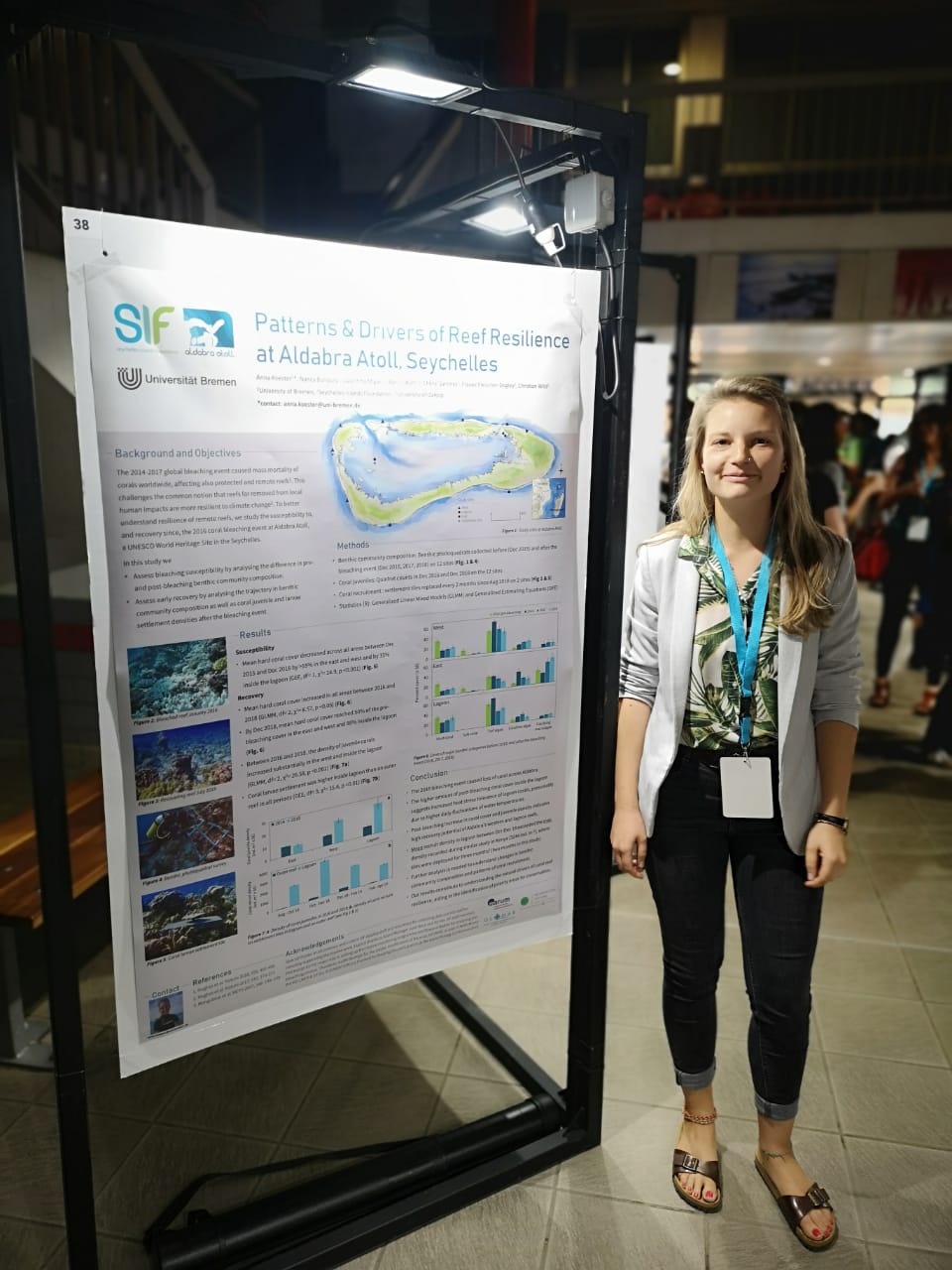Anna Koester
Report of GLOMAR PhD student Anna Koester about her participation in the 3rd Island Biology Conference (IBC) 2019 in St. Denis, La Réunion, France from 8 to 13 July
The third international Island Biology Conference (IBC) took place between the 8th and the 13th of July 2019 at the University of La Réunion in Saint-Denis. Following the first and second IBC in Hawaii and the Azores, the IBC at La Réunion once again drew in about 300 scientists and practitioners from 48 countries to present and discuss work related to the broad field of island biology. Owing to the location of this year’s IBC, a great proportion of the 229 talks and 128 posters concerned research and conservation efforts in the Western Indian Ocean.
Talks and posters ranged from terrestrial to marine biodiversity, large vs. small islands, global change, rewilding, novel ecosystems, invasive species, long-term biodiversity monitoring, species interactions and networks, epidemiology and emergent diseases, paleobiology and biogeography, ecology and society, and interdisciplinary studies. Covering such a variety of topics and disciplines is of great importance to discuss island biodiversity and conservation challenges. Particularly on small islands the need for interdisciplinary and combined efforts are necessary for successful conservation of island biodiversity. This conference facilitated the exchange between scientists, practitioners and managers both within and among islands.
Right at the beginning of the conference on the 8th of July, I had the opportunity to present first results of my PhD with a poster titled ‘Patterns and drivers of reef resilience at Aldabra Atoll, Seychelles’. My work is investigating the effects of the most recent global coral bleaching event at Aldabra Atoll, a remote UNESCO World Heritage Site in the Seychelles. Aldabra has lost about 50% of its corals during the bleaching event in 2016 – my PhD focusses on the reefs’ susceptibility and subsequent recovery of this disturbance event, aiming to get a better idea on the natural resilience potential of coral reefs that are not impacted through local pollution, overfishing or other local human impacts. During the marine ecology poster session, I had the chance to directly discuss my findings with interested researchers and practitioners and exchange about the effects of coral bleaching events at my study site and elsewhere. The poster session was well visited, conference participants off all fields were very interested and I was very happy to be awarded 2nd best poster presentation of that day’s session!
I attended a diversity of different talks and learned e.g. about coral reef restoration efforts in the Seychelles, long term reef studies of the islands in the Mozambique Channel and functional diversity of tropical and temperate fish communities and new ways to assess fish community change and health. I also attended presentations about sea bird ecology, including talks about studies of the sea bird colonies of Aldabra Atoll – a very interesting topic also for a coral reef researcher as the nutrient input of seabirds has recently been shown to highly benefit coral reef resilience. Outside my field of research, I also found myself very interested in the biological history of the Mascarene and Seychelles Islands (e.g. the extinct Dodo and the Mascarene Parrot of La Réunion, the importance of Giant Tortoises as herbivores and seed dispersers) and the ever apparent problem of invasive species (e.g. rats, cats, goats, various birds and plants). I particularly liked the high quality of presentations given by practitioners and managers, showing case studies of success and failure of conservations efforts in their particular field. Besides the contents of the talks and posters, I also enjoyed seeing such a diversity of presentation styles in the normal but also the plenary sessions, which gave me a good idea of what works particularly well to achieve an effective presentation. Part of the IBC were also various conference field trips, allowing to see the natural perks of La Réunion and to meet different nature organisations. Strong winds meant that me and the rest of the marine ecology field trip participants could not go snorkelling, but we had the chance to meet the director of the Marine Nature Reserve who gave us very interesting insights into the challenges of the local coral reefs.
The Island Biology Conference was a very enjoyable, informative and fruitful meeting which allowed me to meet familiar and new faces and to widen my contacts in the Seychelles and the region from which I can benefit in the future. I therefore want to thank GLOMAR and the KELLNER & STOLL STIFTUNG for funding my participation at the conference!



